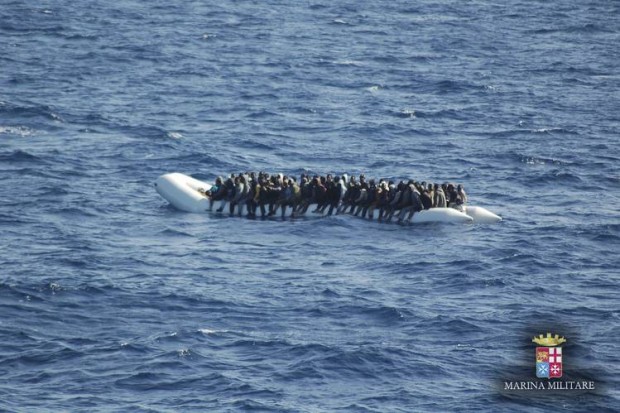European Union bound to send troops to protect Libyan borders from human-trafficking

Seeking to head off a potential increase of migrant flows from North Africa, European leaders discussed Friday scaling up the bloc’s naval operation to fight people-smuggling gangs off the Libyan coast.
U.K. Prime Minister David Cameron told EU leaders gathered in Brussels Thursday night that he was prepared to extend the mission of Royal Navy vessel HMS Enterprise in the central Mediterranean at least until the summer and wanted to see it deployed in Libyan territorial waters, according to a government official. For now, EU boats can only operate in the high seas.
Mr. Cameron also discussed Libya Friday afternoon at a separate meeting with the leaders of France, Germany, Italy, Spain and Malta. EU foreign-policy chief Federica Mogherini also attended.
Several EU leaders warned this week that the number of migrants crossing from Libya to Italy would increase once the Balkan route, which starts in the eastern Mediterranean, is shut down. The EU this week tied up a deal with Turkey aimed at stemming the number of migrants traveling this eastern route.
“What we want to do now is to try to take it to the next stage of going into Libyan territorial waters,” Mr. Cameron said at a news conference. “It is important we start planning now. The better we do in closing down the eastern Mediterranean route, I suspect we’ll see more pressure on the central Mediterranean route.”
The crisis in Libya is moving fast up the agenda in Europe for reasons apart from the migrant crisis.
Despite months of United Nations-led talks to organize a national unity government in Libya, two rival factions are still fighting, leaving a power vacuum in the countryincreasingly filled by the Islamic State terrorist group.
Mr. Cameron said discussions are continuing between the U.S. and European governments on how to maintain pressure on Islamic State.
“Having a functioning government in Libya is going to be crucial,” he said. “You need to have a partner to break up the people-smuggling gangs and to break up the terrorist organization.”
However, Italian Prime Minister Matteo Renzi said Friday his government had no plans to intervene directly. “We are against a military initiative, without a request from the local government,” he told reporters.
Ms. Mogherini told the leaders Friday she will call a joint meeting of EU foreign and defense ministers on April 18 to discuss Libya, an EU official said.
The EU launched a naval mission in May 2015 that was later named Operation Sophia as part of its response to the migration crisis. At the time, hundreds were dying every month on a treacherous sea journey from Libya to Europe.
The operation has been hampered. Without the backing of a united Libyan government, the naval operation can’t enter Libyan waters.
Currently, the operation is able to stop and seize vehicles and arrest suspected smugglers only in international waters. If the EU could operate in Libyan waters, it could be more effective in clamping down on migrant boats, and it could return people to Libya instead of bringing them to Europe.
The European Commission, the EU’s executive arm, has said that so far there is no sign of a major uptick in the number of migrants crossing from Libya to Italy. However Mr. Renzi warned other leaders on Friday that an increase in the coming months was inevitable, according to several people familiar with discussions.
In a letter on Monday to foreign ministers, seen by The Wall Street Journal, Ms. Mogherini had warned that 450,000 people displaced from their homes in Libya could cross to Europe. She also signaled she would explore possible cooperation between the EU naval operation and the North Atlantic Treaty Organization if migrant flows pick up.
One person briefed on Friday’s discussions said the bloc plans to scale up its military preparations to expand Operation Sophia. That could potentially include organizing a new Force Generation process, in which EU members meet to discuss what assets and resources they can provide.
EU officials have long warned that moving into Libyan territorial waters would carry risks, given the lawlessness that has prevailed there in recent months and the presence of Islamic State.
Any casualties from EU action off the Libyan coast could “trigger a negative response from the local population and the wider region, jeopardizing support and follow up,” according to a EU draft mission plan from last spring.
How to submit an Op-Ed: Libyan Express accepts opinion articles on a wide range of topics. Submissions may be sent to oped@libyanexpress.com. Please include ‘Op-Ed’ in the subject line.
- Foreign Ministry Reviews 2024 Performance, Sets 2025 Goals - November 28, 2024
- Ceasefire Begins on Lebanon-Israel Border - November 28, 2024
- Israel Intercepts Drone Near Egyptian Border - November 28, 2024


